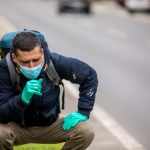Sarcoidosis
INTRODUCTION
Sarcoidosis is a disease in which abnormal collections of cells called granulomas are formed as nodules in multiple organs. Granulomas most often appear in the lungs or the lymph nodes, but virtually any organ can be affected. The cause of sarcoidosis is unknown and it can occur all of a sudden and disappear spontaneously also but normally, the onset is gradual. Sarcoidosis can be asymptomatic or long standing and go on to produce problems that come and go, sometimes for a lifetime.
What are symptoms of sarcoidosis?
Patients with sarcoidosis are often asymptomatic and it is picked up incidentally on routine testing. It is a multisystem disease and can affect any organ. Common symptoms are fatigue, weakness, low grade fever, weight loss, aches and pains. System specific symptoms in order of occurrence are enlargement of lymph nodes, especially in the chest, shortness of breath, dry cough, chest pain arthritis (joint pain and swelling), dry eye, red eyes, blurred vision, or skin lesions (erythema nodosum- red nodules on skin), if kidneys are involved then kidney function test will be abnormal and high serum calcium can occur and if untreated, can lead to kidney failure, if heart is involved then abnormal heart rhythms, palpitations, dizziness, fainting can occur. Neurologic involvement symptoms include headache, confusion, seizures and Bell’s palsy and rarely there is enlargement of the salivary or tear glands and cysts in bone tissue.
What is the cause of Sarcoidosis?
Sarcoidosis cause of is not known. Possible causes are exposure to some specific environmental agents, several microorganisms, like viruses and bacteria. If you have Sarcoidosis you can be reassured that it is usually not crippling and often resolves spontaneously and in some with treatment in 1 to 2 years. It is not a cancer, not an infection and so not contagious to from you to others.
How is sarcoidosis diagnosed?
Sarcoidosis is initially suspected by your doctor based on medical history, routine tests, a physical examination, and a chest x- ray and computed tomography [CT] scan. Once suspected you as possible case of sarcoidosis by your doctor you may search for a sarcoidosis specialist near me who will confirm the diagnosis of sarcoidosis by eliminating other diseases with similar features like tuberculosis and fungal infections or cancer. A small tissue sample called FNAC/biopsy from an affected tissue or organ is usually recommended by sarcoidosis specialist to identify a granuloma. Most commonly the biopsy samples are taken from lung or lymph nodes with a procedure called bronchoscopy with EBUS-TBNA which is done by a pulmonologist who is a sarcoidosis specialist. The cost of an EBUS Test in Delhi usually ranges from 50000 to 90000 rupees. Occasionally, an MRI and/or PET scan may be needed to determine the extent and severity of the disease, especially when sarcoidosis in affecting the eyes, heart, or nervous system.
What pulmonologists/sarcoidosis specialists do to cure sarcoidosis?
Some patients with sarcoidosis require no treatment especially if it detected incidentally in asymptomatic individuals or when symptoms are mild. These patients tend to improve spontaneously on its own. Treatment is recommended in patients with symptoms like shortness of breath and cough or poor lung function test. When sarcoidosis affects the eyes, heart, nervous system or kidneys, it is treated even when symptoms are mild because of the risk of complications when these vital organs are involved. Other reasons for treatment include fever, fatigue, joint pains, skin disease, or the upper airway disease. The main goal is to keep the lungs and other affected organs functionally well and to relieve symptoms. Corticosteroids drugs are the main stay treatment given by most sarcoidosis specialists. Prednisone is the most often prescribed corticosteroid and the dose is usually 20 to 40 mg/day followed by a slow taper to the lowest effective dose. Treatment with oral glucocorticoids is generally given for 6 to 12 months. Sarcoidosis tend to relapse after steroids are stopped although relapses usually respond to restarting steroids. Therefore, it may be necessary to give steroids for several years, sometimes for as long as the disease remains active to prevent relapse and frequent visits to sarcoidosis specialist are needed so that the doctor can monitor for activity of sarcoidosis and adjust the treatment if necessary.
Potential side effects of long-term glucocorticoids, and the benefits are out weighed against the risks of sarcoidosis disease itself. The common side effects of steroids include increased appetite and weight gain, acne, mood changes, and insomnia. Long term and serious side effects include diabetes, easy bruising, swelling/rounding of the face and a hump in the back called “cushingoid” appearance, weakening of bones, body hairs, cataracts, high BP, gastric ulcers, avascular necrosis (a serious joint problem), and infections.
Patients who relapse or who cannot tolerate or who do not respond glucocorticoids are given option of drugs like Methotrexate, Mycophenolate mofetil (MMF), azathioprine that reduces inflammation/granulomas by suppressing the immune system, These drugs also help to lower the dose of glucocorticoids used to treat sarcoidosis and help reduce glucocorticoid side effects.
FAQ
Sarcoidosis is an uncommon inflammatory illness that primarily affects the lymph nodes and lungs but can affect any organ in the body. Granulomas, which are tiny groupings of inflammatory cells that might impair organ function, are its defining feature.
Sarcoidosis symptoms might vary depending on which organs are impacted, however they can include joint discomfort, swollen lymph nodes, exhaustion, fever, skin rashes, coughing persistently, and chest pain.
A patient's medical history, physical examination, imaging tests (such as CT or X-rays of the chest), blood tests, and occasionally a biopsy of the affected tissues to confirm the presence of granulomas are used to diagnose sarcoidosis.
Although the precise cause of sarcoidosis is unknown, exposure to specific environmental triggers, such as infectious agents or airborne particles, is thought to play a role in addition to a genetic susceptibility.
Although there is not a cure for sarcoidosis, treatment aims to lessen inflammation, stop symptoms, and avoid problems. Sarcoidosis frequently goes into remission on its own without the need for medical intervention.
Yes, depending on the organs afflicted, specialists such as pulmonologists, rheumatologists, and dermatologists may treat sarcoidosis. Furthermore, there might be multidisciplinary sarcoidosis clinics or centers at some hospitals.
Obtaining recommendations from your family doctor, calling hospitals or medical centers with specialized departments in pulmonology, rheumatology, or dermatology, or looking through online listings of healthcare providers are some ways to locate sarcoidosis specialists in Delhi.
When you see a sarcoidosis specialist, the physician will review your medical history in detail, examine you physically, and order any necessary diagnostic tests to identify the best course of treatment and determine the level of organ involvement.
Sarcoidosis can be treated with immunosuppressive drugs, anti-inflammatory pharmaceuticals, corticosteroids to reduce inflammation, and in certain circumstances, biologic therapies. The organs impacted and the degree of symptoms determine the course of treatment.
You can treat the symptoms of sarcoidosis at home in addition to receiving medical care by exercising frequently, maintaining a nutritious diet, abstaining from tobacco use and exposure to toxins in the environment, getting adequate sleep, and controlling stress. It is crucial that you adhere to your doctor's advice and make routine follow-up appointments.



